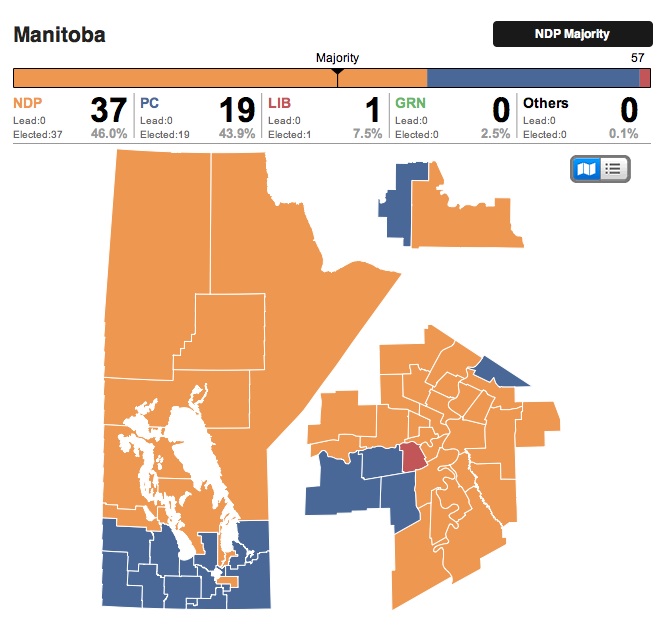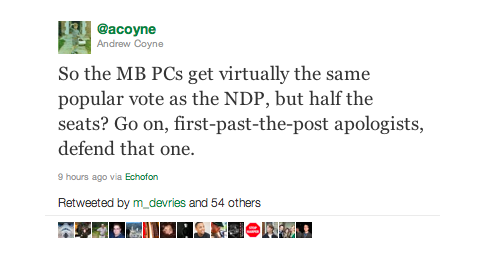
The Manitoba New Democrats rolled to a 4th straight majority win over the Progressive Conservatives. Canadian election campaigns are mercifully short and while the Manitoba contest was a curt 4 weeks, the advertising and rhetoric was brutal in this battle for the political middle. The Manitoba economy, like parts of the upper Midwest of the US isn’t reeling like the rest of North America, so there wasn’t a great thirst for change. The opinion polls had the Progressive Conservatives up earlier in the year, but the New Democrats rallied under Premier Selinger.
The Progressive Conservatives narrowed the gap in terms of the popular vote, but gained no additional seats. Andrew Coyne of Macleans expressed his annoyance at the current first-past-the-post {candidate with a plurality of votes wins the riding, i.e., district}::
 He used the “anomalous” results to plug his articles on election reform. I’m actually in favor of election reform, such as STV, but I have serious doubts if it would matter in Manitoba. The province is divided:: the rural south votes Progressive Conservative by a wide margin, while urban Winnipeg and the aboriginal North votes NDP by a sizeable but lesser margin, on average. The unofficial results are here. Given the geographic party split of the province and the two-party “duopoly”, I’m not seeing a lot of opportunity for vastly different results. If there were larger ridings with more seats per riding, the STV gamechanging math breaks down when one looks at the regional breakdowns for 2007. The NDP and PCs had their respective regional strongholds and it will be interesting to see how the final 2011 shake out.
He used the “anomalous” results to plug his articles on election reform. I’m actually in favor of election reform, such as STV, but I have serious doubts if it would matter in Manitoba. The province is divided:: the rural south votes Progressive Conservative by a wide margin, while urban Winnipeg and the aboriginal North votes NDP by a sizeable but lesser margin, on average. The unofficial results are here. Given the geographic party split of the province and the two-party “duopoly”, I’m not seeing a lot of opportunity for vastly different results. If there were larger ridings with more seats per riding, the STV gamechanging math breaks down when one looks at the regional breakdowns for 2007. The NDP and PCs had their respective regional strongholds and it will be interesting to see how the final 2011 shake out.
This doesn’t mean I feel STV shouldn’t be implemented, but that the 2011 Manitoba results might not be the best case to pitch for it. Tomorrow’s Ontario provincial election, well, that’s a different story. Ontario has three strong provincial parties {PC, Liberal, NDP} and strategic voting is likely to be a factor in quite a few ridings.

Comments